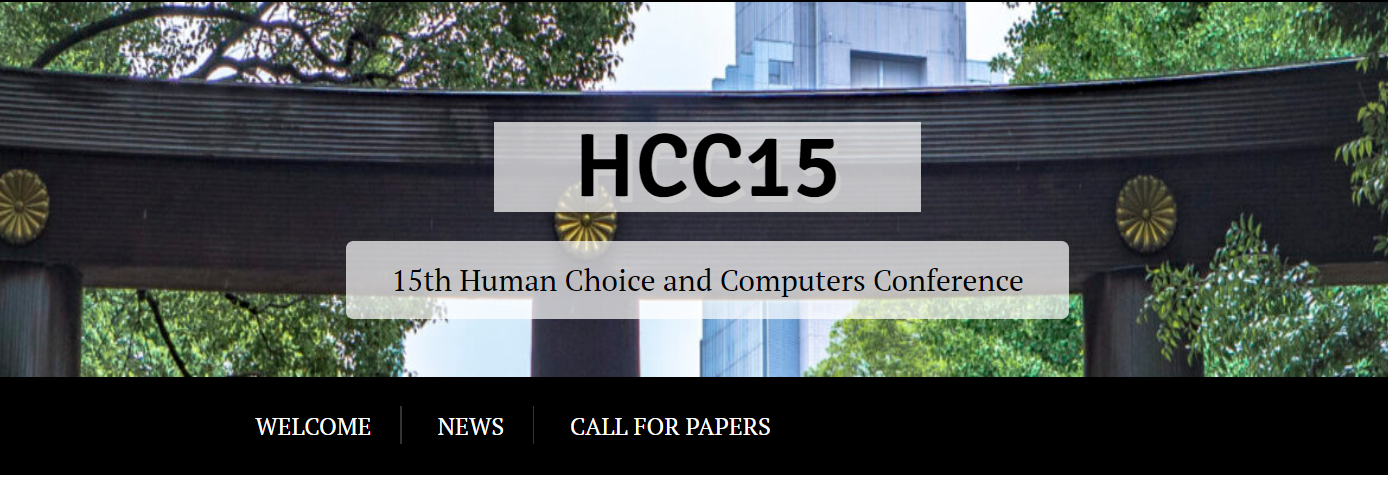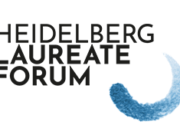15th Human Choice and Computers Conference (HCC) to explore “Human Choice and Digital by Default: Autonomy vs Digital Determination”
Since the advent of COVID-19, whole sectors of the economy in many countries, or at least those that can, have been working remotely, from home. This has brought a whole new meaning to the maxim ‘digital by default’ and brought home some of the potential pitfalls. Not only are we now missing the paralinguistic benefits of body language and location context in our communication, but the trend towards digital meetings – already strong – has accelerated, meaning fewer and fewer of us have any choice whether or not to embrace the digital alternative to in-person meetings.
The encroaching influence, moreover, of machine learning based systems that can embed the biases inherent in the data they have learnt from, threatens to entrench the societal problems of the past, rather than redress them, in this new online world. Issues of privacy, accountability, fairness and access are all coming more and more to the fore of discussions around the digital, with face-offs between the Tech Giants unfolding over their fundamental business models.
Since 1974, the Human Choice and Computers (HCC) conference series has consistently fostered innovative thinking about the interfaces between society and technology. HCC15 in 2022 will be held in Tokyo, Japan from 9-11 September 2022, hosted by the Faculty of Global Informatics (iTL), Chuo University, Tokyo.
HCC15 will focus on “Human Choice and Digital by Default: Autonomy vs Digital Determination” and welcomes inputs from members of academia and research, civic society, computing associations, industry, and the IT professions on the following (and related) themes:
- Ethical and Legal Issues for Data Analytics and Big Data
- Social Accountability and Responsibility for Computing and Data Utilization
- Digitalization, embodiment, mobility and repairment in relation to Gender and Diversity, Work, Educational and Daily Life
- How data can support rather than infringe personal liberty
- Harnessing Information with Unconscious Bias
- Legal Systems for Criminal Offences and Abuse
- Ethical governance models for new data economy ecosystems
- How did we get here? Precedents, and lessons from the past
- Personal Autonomy in Information Systems: where is the human in our models?
- How culturally diverse interpretations / understandings of life-work balance can help us shape a more human-centric computing environment
- Personal freedom and informational security
- Can our personal choices add up to an environmental impact?
- ICT for Development: how much choice outside the developed world?
- Global or local? How are the lived experiences of the marginalized and dispossessed citizens of developing countries affected by government reactions and policies?
- Security and privacy for Data Analytics and Big Data
- Using collaborative skills to work with team members in order to ensure reliability, availability and performance of applications
- Working, playing, entertaining and relaxing at home: seamless integration in our working and private digital lives
For more information, visit www.hcc15.net
* * *
HCC15 will also welcome co-located TC9 Working Group Workshops:
WG9.2 – Social Accountability and Computing
Need for Social Accountability – Art Nouveau of Digitalization?
Covid-19 forced interaction at work and private life to go digital so fast that it could not be seen beforehand. However, we can raise the question, is this a desirable outcome or not? By taking a digital leap, what did we achieve from the viewpoint of environment, equality and wellbeing? Is there a need to start to see what good and beauty we could achieve using technology, instead of focusing on efficiency? What does social accountability mean while digitalization is progressing at a different pace in a different context? What would it mean from an organizational or societal perspective? Do we need a new Art Nouveau for digitalization to ensure the digital society is good for people and the environment?
The objective of Art Nouveau was to create beautiful yet sustainable things for people with arts and craftsmanship. One of the reasons for the birth of Art Nouveau was the resistance towards industrialization that offered cheap standardised products to everybody. Digital Art Nouveau could be the rise of human-centric digitalization, where other values than economy and efficiency could also flourish.
We encourage the submission of papers focusing on the following and related themes.
- Slow tech
- Artificial intelligence helping human intelligence
- Sustainability of digitalization
- Human-centric digitalization
WG9.4 – The Implications of Information and Digital Technologies for Development
Digital Approaches to Development Issues during COVID-19:
Global Perspectives
The COVID-19 pandemic has created a plethora of new needs, encompassing the domain of health infrastructures and those of emergency assistance, social protection and socio-economic development measures. Digital approaches have been largely leveraged in COVID-19 responses, creating solutions that cover all such domains: COVID-19 tracking has been delegated to digital systems that have raised advocacy, but also concerns of privacy and data governance related to mobile-based apps (Taylor et al., 2020). Emergency assistance and social protection have been linked to algorithmic approaches that have facilitated distribution of subsidies, but also raised concerns of algorithmic justice (Cerna Aragon, 2020; Lopez, 2020). More at large, digital routes to socio-economic development have been adapted in the ongoing pandemic, seeking to tailor digitality in ways that seek to meet the needs of the new poor and of those whose vulnerability has increased.
Against this backdrop, this track invites papers that deal with digital approaches to the solution of issues posed by the COVID-19 pandemic. We are especially interested in issues that pertain to the domain of socio-economic development, and their configurations at this time of global crisis. We invite submissions on topics that include, but are not limited to:
- Digital health infrastructures in the pandemic
- COVID-19 tracking in developing countries
- Datafied social policies in the Global South
- Algorithmic justice in relation to emergency assistance
- Digital social protection during COVID-19
- Digital inequalities in the COVID-19 context.
References:
Cerna Aragon, D. (2020). On not being visibile to the state: The case of Peru. COVID-19 from the Margins, https://data-activism.net/2020/06/bigdatasur-covid-on-not-being-visible-to-the-state-the-case-of-peru/
Lopez, J. (2020). The case of the Solidarity Income in Colombia: The experimentation with data on social policy during the pandemic. COVID-19 from the Margins, https://data-activism.net/2020/05/bigdatasur-covid-the-case-of-the-solidarity-income-in-colombia-the-experimentation-with-data-on-social-policy-during-the-pandemic/
Taylor, L., Sharma, G., Martin, A., and Jameson, S. (2020). What does the COVID-19 response mean for data justice? In Taylor, L., Sharma, G., Martin, A., and Jameson, S. (Eds.), Data Justice and COVID-19: Global Perspectives, London: Meatspace Press, pp. 8-18.
WG9.5 Our Digital Lives
Given the prevalence of connectivity and digital work in its various forms, we are interested in studies (including work-in-progress) exploring any aspect of ‘Our Digital Lives’ following our Working Group’s general theme. Example topics include (but are not limited to):
- digital work in its social context
- digital health
- digital education
- digital labor
- digital games
- digital tourism
- online communities
- social media
- augmented or virtual reality
- emerging technologies
- artificial intelligence
Submissions are welcomed that offer fresh theoretical or empirical insights into how our digital lives have transformed the way we work, communicate, and play together.
WG9.8 Gender, Diversity and ICT
Digitalization, embodiment, mobility and repairment in relation to Gender and Diversity, Work, Educational and Daily Life
The Covid-19 pandemic makes visible the intersecting positions and hierarchies of embodied work, as well as the merits and limits of the digital. We invite feminist techno-science approaches to themes of gender, diversity, and inclusion vis-a-vis the societal-scale shifts to online platforms (Zoom, Microsoft Meetings, etc.) and more digitalized lives and labor in response to the pandemic that foregrounds how everyday life depends on materialities and embodied labor. Doctors, nurses, drivers, teachers, social workers, cleaners, cashiers, researchers and many others are essential to fighting the pandemic and meeting lives’ and societies’ basic necessities.
Hence our broad question: how should we conceptualize, design for, and speak about “recovery” from the pandemic? Who should / will be included in a “recovery” of pre-pandemic practices of travel and affiliated conceptions of place and mobility as privileges tied to class, gender, ethnicity, etc? How are we to conceptualize and thereby shape how we think and feel about possible futures and the role of digital technologies therein? What happens, moreover, if we shift from “recovery” to “repairment”? Repairment can further implicate notions of entanglement and co-generation, evoking new questions. What is needed is to repair unjust social, cultural, spiritual, economic, and political structures and systems, and most especially the climate and ecosystems of the planet we live on – can we discern and better design for our interrelationality via computational and network technologies?
WG9.9 ICT and Sustainable Development
Covid-19 – Missed opportunity or the transition
to a sustainable and fair society?
For a couple of decades now researchers within fields related to ICT have discussed the sustainability-related potential of the technology. Conventional approaches include for example optimization of energy and resource use in production and transportation, and dematerialization (i.e. replacing physical goods with digital ones). However, despite the potential of ICT to contribute to sustainability, we have not yet seen this potential being fully exploited. Instead, the environmental footprint of ICT products (energy consumption, resource use, disposal) is increasing, among other things due to the short useful life of many ICT products, its linear value chain (“take-make-waste”) and various more or less unexpected rebound effects of ICT development. Among other things, it has recently been estimated that data centers world-wide consume around 200 TWh yearly, and this figure is likely to increase in the coming years with among other things the increased popularity of video and game streaming and crypto currencies such as Bitcoin (which currently consumes as much electricity as the Netherlands to maintain). In summary, while there is certainly potential for ICT to do good for the environment, current trajectories show that the footprint of ICT is increasing while the full sustainability-related potential of the technology is not exploited.
But with the Covid-19 pandemic currently ongoing – to recite Naomi Klein and the title of the HCC13 conference – this (surely) changes everything! We have been forced to drastically change our unsustainable transportation and consumption patterns and have instead relied on ICT-supported, more sustainable, alternatives. Well, according to the EEA Briefing “COVID-19 and Europe’s environment: Impacts of a global pandemic”, the environmental impacts have not been as radical as many researchers hoped for and believed when the almost world-wide lockdown started around one year ago. Many now instead argue that the pandemic was a “missed opportunity” to radically transform our society into a more sustainable one. But perhaps it is still not too late?
We encourage the submission of papers focusing on the relationship between ICT and sustainable development in general, but which reflect on the role of ICT in a sustainable and fair post-Corona society in particular.
* * *
Paper Submission
The conference is open to attendees at all stages of career and education, whether you are at the start, middle or peak of your career, either as academics or practitioners. Submitted papers should be approximately 3,000-5,000 words in length. Please return your paper, using the appropriate format, through http://www.hcc15.net/
There are no video conferencing facilities at the venue. Remote presentation via Zoom will be considered on a case-by-case basis.
Please be sure to indicate whether you are submitting to the conference general theme, or to one of the specific workshops. Papers must be anonymized for blind peer review.
Important Dates
January 31, 2022 – Submissions due
March 31, 2022 – Notification of acceptance/rejection
April 30, 2022 – Submission of camera-ready papers
July 31, 2022 – Deadline for early bird registration
September 9 – 11, 2022 – Conference dates
Chairs:
Conference Chairs: Taro Komukai, David Kreps
Programme Committee Chair: Robert Davison
Organizing Committee Chair: Kaori Ishii
Proceedings Editor: David Kreps
Proceedings Co-Editors: Taro Komukai, Robert Davison, Kaori Ishii
Workshop Chairs:
WG9.2: Jani Koskinen, Anne-Marie Tuikka
WG9.4: Johan Ivar Sæbø, Silvia Masiero
WG9.5: Brad McKenna, Petros Chamakiotis, Kathrin Bednar
WG9.8: Charles Ess, Johanna Sefyrin, Sisse Finken
WG9.9: Per Fors






